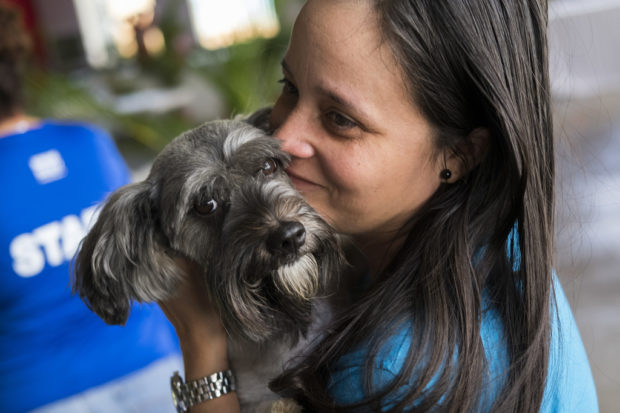
Our Spayathon for Puerto Rico™ initiative has helped thousands of animals since we launched in 2018. With this new law we will be able to continue helping animals in underserved communities on the island. Photo by Dennis M. Rivera Pichardo/AP Images for the HSUS
The Humane Society of the United States and its affiliates have been pressing hard and with steady success to reduce companion animal overpopulation since the 1970s. Lately, we’ve done so with a special focus on underserved communities and constituencies through our Rural Area Veterinary Services, Pets for Life and Spayathon for Puerto Rico initiatives. These programs have targeted situations in which the animal overpopulation challenge has proved more intractable and the managers of these programs have met that challenge with creative, well-designed and properly resourced approaches.
for Puerto Rico initiatives. These programs have targeted situations in which the animal overpopulation challenge has proved more intractable and the managers of these programs have met that challenge with creative, well-designed and properly resourced approaches.
Yesterday, Governor Wanda Vázquez Garced signed into law a measure that cleared both chambers of the Legislative Assembly of Puerto Rico a few weeks ago. The passage into law of Senate Bill 1621 resolved an ambiguity hanging over the HSUS-led Spayathon initiative, which has since 2018 provided high-volume spay/neuter and vaccination services on the island. The new law creates a framework for temporary licensure. This approach will permit U.S. and Canadian-licensed veterinarians to continue helping to meet the needs of animals in underserved communities on the island. It also sets the stage for future efforts carried out by the HSUS and other organizations to extend their work to end animal overpopulation there.
In many jurisdictions throughout the world, local and national laws frequently limit or prohibit the practice of veterinary medicine by foreign or out-of-state veterinarians who lack a locally valid practitioner’s license. Thankfully, Puerto Rico’s legislature agreed with us that such regulations, sensible in many cases, would impede ongoing efforts to address the island’s chronic homeless animal population challenge. There are only about 300 veterinarians registered to practice in Puerto Rico (whose current population is 3.2 million people). However, many of them reside and work on the U.S. mainland, so the number of practitioners in Puerto Rico may be as low as 200. Moreover, there are only a handful of low-cost veterinary clinics on the island, and with median household income at $20,166 and per capita income $12,451 (in 2018 dollars), a large percentage of the population effectively has no access to veterinary care for their pets.
Previously, we had been carrying out our work on the island through executive orders signed by the governor that authorized outside veterinarians to participate in Spayathon, which has helped more than 53,000 animals with lifesaving surgeries and vaccinations across the island, at no cost to owners. Now, we’ll be able to attract and deploy veterinary personnel more efficiently, with tangible benefits flowing to the people and animals of Puerto Rico.
The common denominators of RAVS, PFL and Spayathon are a commitment to top-notch animal care, meaningful engagement with local partners and a respect for the many wonderful people trying to take good care of companion animals in their communities, whether they be pets or strays. These programs rely on the love and goodwill that people have for animals, and they help to remove the barriers and obstacles to related services, supplies and expertise that can make a world of difference for animals. I am so proud of my colleagues and their partners for their contributions to these worthwhile efforts, just as I am grateful to our donors for their generous commitment to sustaining these programs.
The post Puerto Rico sets the stage for long-term veterinary support, as HSUS programs to help underserved communities thrive appeared first on A Humane World.
Enviroshop is maintained by dedicated NetSys Interactive Inc. owners & employees who generously contribute their time to maintenance & editing, web design, custom programming, & website hosting for Enviroshop.
